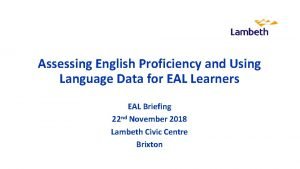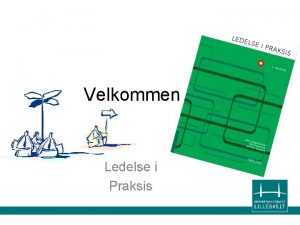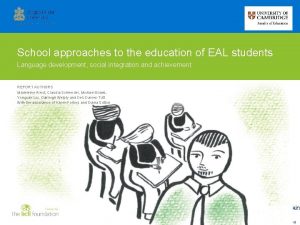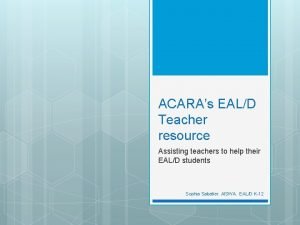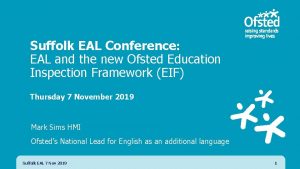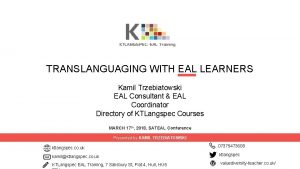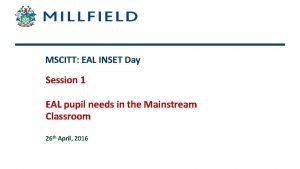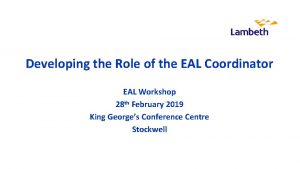Managing The New National EAL Assessment Data Collection










- Slides: 10

Managing The New National EAL Assessment Data Collection and New Development in School Census Feyisa Demie Head of Research and Adviser for School Self. Evaluation Briefing Session Education and Learning Professional Development Centre International House 1 st July 2016

BRIEFING SESSION AIMS The aims of the Lambeth briefing sessions are to examine: • NEW National English as an Additional Language (EAL) Assessment Data Collection • Changes in School Census From Autumn Census and then annually from Spring Census onwards. EXISTING ITEMS EXTENDED to include nursery schools 1. Ethnicity 2. Language code NEW ITEMS 1. Proficiency in English 2. Country of birth 3. Pupil nationality

Why do we need Census Data? 1. School Census is a statutory return for all maintained Nursery, Primary, Secondary, Special Schools, Academies and City Technology Colleges in England 2. School Census is collected from schools on a termly basis 3. School Census is the most important source of information about schools. The LAs and Df. E use the data to: • • • Allocate funding to LAs, schools Project pupil and teacher numbers Produce league tables and information for OFSTED inspections of schools Monitor and evaluate government policies Identify underachieving groups 4. New EAL Assessment Census may be used : 1. 2. 3. Allocate EAL funding to schools Produce RAISEonline information for OFSTED inspections of schools Identify underachieving EAL pupils

Why EAL Matters? Policy concerns • There is a growing bilingual population in England it has increased by 60% since 1997. • The 2015 Schools Census indicated there are over 1, 249, 070 EAL pupils in England. This is about 18% of the school population (Df. E, 2016) • In Lambeth 52% are EAL pupils • Over 350 languages are spoken in England’s schools • There is a need for additional targeted support for EAL pupils to improve their levels of fluency in English. • This is a major concern for schools, LAs and EAL professionals as it ignores the needs of EAL pupils who are underachieving

Why EAL Matters? EAL Achievement Concerns • A number of individual research studies have explored the relationship between EAL and attainment. For example Demie 2005; Demie and Strand 2006 analysis of a large sample of KS 1, KS 2 and GCSE data suggests that pupils who spoke English as an additional language scored significantly lower than those who spoke English as their first language. • The studies confirm that pupils in the early stages of fluency perform at very low levels, while bilingual pupils who are fully fluent in English perform better, on average, than English-only speakers. • Df. E Key Stage 1, 2 and 3 data also shows show that pupils for whom English is a first language consistently outperform their peers for whom English is an additional language in all three core subjects. • Underachievement of EAL pupils, particularly those not fully fluent in English, continues to be a concern for policy makers and schools in England.

GCSE Attainment Gaps between EAL fully and Non fluent (5+A*-C incl English and Maths) • Pupils non fluent in English perform well below the monolingual English speakers. • Fully fluent pupils have consistently been the highest performers. • The KS 2 and GCSE data indicates that the worryingly low achievement of a number of EAL pupils has been masked by Government Statistics which have failed to distinguish between EAL pupils who are fully fluent and not fluent in English.

EAL attainment at KS 2 in LA and England in Reading, Writing and Maths (Level 4+)

EAL KS 2 and GCSE Performance by levels of fluency in English in Lambeth LA (%) KS 2 Level 4+ 5+A*-C Primary 2015* Secondary 2015** EAL Stage 1 (Beginners-New to English) EAL Stage 2 (Becoming familiar with English) 17% 43% 0% 13% EAL Stage 3 (Becoming confident as user of English) 81% 42% EAL Stage 4 (Fully Fluent in English) English Only EAL Stage 1 -3 (non-fluent in English) All Pupils- National Average 96% 85% 68% 80% 66% 54% 39% 53% EAL Stages of English Fluency

Conclusions and Policy Implications • We would argue that language barriers remain the key factor affecting the performance of EAL pupils in English schools. • However, the findings that pupils who are fully fluent in English perform better than English only speakers. They demonstrate that once the disadvantage of language is overcome, it is possible to attain high levels of achievement for all key stages. • This underlines the importance of additional targeted support for EAL pupils to improve their levels of fluency in English. More needs be done to help English learners to achieve education equality with monolingual English speakers in the classroom. • There is a need by central government to provide additional targeted funding for EAL pupils for at least 6 years. • We also need EAL National Assessment Systems to monitor EAL performance beyond language in common. • The absence of national data which identifies stage of English fluency and patterns of attainment of EAL pupils places serious constraints on effectively targeting policy and practice developments at the national level.

The next Steps? 1. English Proficiency is a major factor in understanding how pupils with EAL achieve. We need national data 2. From Autumn 2016 onwards, all schools will have to include details of English Proficiency of pupils with EAL pupils as part of the School Census. 3. Todays briefing sessions aims: • To review the new EAL assessment systems in Lambeth and offer guidance in using the new national English Proficiency scales as part of census. • It will also covers other changes to Df. E school Census data collection
 Eal proficiency assessment
Eal proficiency assessment Eal proficiency assessment
Eal proficiency assessment Eal curriculum 2021
Eal curriculum 2021 New eal curriculum victoria
New eal curriculum victoria Landsat collection 1 vs collection 2
Landsat collection 1 vs collection 2 Documentary collection
Documentary collection Define data collection method
Define data collection method The terms external secondary data and syndicated
The terms external secondary data and syndicated Ledelse i praksis erhvervscase
Ledelse i praksis erhvervscase School approaches to the education of eal students
School approaches to the education of eal students Acara eal/d
Acara eal/d
